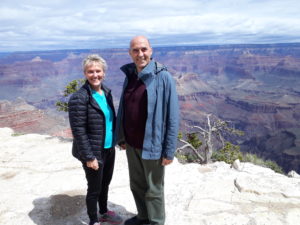Every journey is different
“I’ve got ‘myeloma’ and I’ve never even heard of it before!” That was Corley Steunenberg’s initial reaction when she was diagnosed with myeloma.
The warning signs started appearing in December 2019. “It started with a very sore back. It got so bad that on Christmas Eve, I said to my husband – I can’t get through Christmas without getting some sort of treatment.”
After visiting multiple doctors and getting nowhere, she was finally diagnosed with lambda light-chain myeloma in January 2020. She was shocked. “I was thinking, ‘How long have I got to live?’ It was incredibly stressful.”
“Thankfully it wasn’t the type that has a shortened life expectancy.”
Then, before she could even catch her breath, she began treatment in February and she was placed in a clinical trial programme. Because of the fractures in her back, she had to stay in hospital longer than usual, which also meant that her recovery would take longer.
“I still had trouble doing anything, and that’s why they kept me in hospital for so long. I couldn’t sit up or get out of bed. I couldn’t shower or toilet by myself.”
When Corley was finally sent home, she could barely walk. She had to learn again, one step at a time. “I had a hospital bed, a walker, and a wheelchair.” She also had a very supportive husband who helped care for her.
Time passed slowly during her recovery, and her mind would often drift toward dark places. “I sometimes wondered if I could have avoided the fractures.”
What could she have done differently? What if her doctor had caught it sooner? “But, those types of questions are unhelpful to ask yourself after you’ve already been diagnosed.”
Gradually, her condition improved and she was able to get more of her independence back. “I can walk without aids now, but if I do a long walk, I use my husband’s walking pole for stability. It makes you feel a bit more athletic having a walking pole instead of crutches!”
Today, she still gets back pain now and then, but she knows it’s not from the fractures. She also knows that she can contact LBC Support Services Coordinator Natasha for support, if she needs it.
Corley met Natasha early in her treatment at Middlemore, after talking to a man who had myeloma for six and a half years, and his wife – who passed on Natasha’s details.
“Natasha’s awesome. She does a fantastic job. She tries to connect people with ‘like’ issues.”
“Everyone’s myeloma seems to be different.” Some people experience fractures almost immediately. Other people are diagnosed well before the obvious signs of myeloma even show themselves.
“There are a lot of stories out there, and there are a lot of people who have had a much harder time than I have.” And, while there are many stories of people with myeloma and different experiences to learn from – one thing she knows for certain, is that positivity is important.
“The stories I wanted to read were of people who went through the journey and things started to look better. There is a lot of negativity among people living with cancer, and that is not supportive. It makes you feel worse.”
What made Corley feel optimistic, was the LBC Support Group she attended regularly. “You have the people who belong to these groups, who are positive and want to help people and talk about their journeys.”
She was moved by the kindness and support of the couple who introduced her to Natasha.
“I thought it was awesome that even after six years, the couple were still going to LBC support groups to encourage other people.”
For many people, living with a cancer like myeloma can be a lonely and isolating experience, and Corley is aware of how different it could have been, had she not had her husband. “I can’t imagine going through what I went through on my own. It’s important to have a supportive network around you.”
Corley’s support network meant that she had the strength to get through Christmas with severe back pain, learn how to walk again, and embrace positivity during a time of uncertainty.
“Don’t let negative people pull you down. Focus on the stories of hope, and remember everyone’s journey is different.”
Fast Facts: Light-chain myeloma (LCMM)
- A less frequent type of multiple myeloma (MM)
- It can be more aggressive than other forms of myeloma
- It is characterized by the inability of the malignant plasma cells to produce heavy chains, resulting in the exclusive production of light chains.


